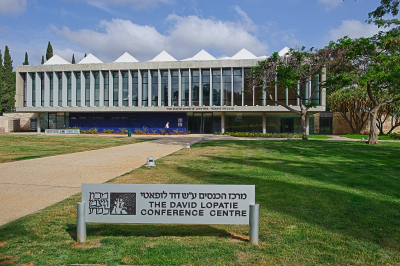Rena Friedman, LAS '15, Attends Top International Computer Science Conference
Rena Friedman wins a grant from the ACM Special Interest Group on Algorithms and Computation Theory (SIGACT) to attend the sixth annual Innovations in Theoretical Computer Science (ITCS) conference at the Weizmann Institute of Science in Israel.

How can computers predict that people who click on images of hand cream are more likely to be interested in, say, baby shampoo? Why do natural photos on the computer appear smooth? How can millionaires safely share credit card information online, without being in danger of their information getting hacked?
Rena Friedman, a recent graduate of the Lander College of Arts and Sciences (LAS), learned the answers to these questions, and others, at the sixth Innovations in Theoretical Computer Science (ITCS) conference she attended last month at the Weizmann Institute of Science in Rechovot, Jerusalem. Sponsored by the ACM Special Interest Group on Algorithms and Computation Theory (SIGACT), the three-day conference brought together international researchers from companies like Google, Microsoft, IBM and AT&T. There were Columbia and MIT researchers, Ph.D candidates who had, according to Rena, “been studying computer science for years.”
And Rena—a Class of 2015 graduate—soaked up every word.
Early on in her college career, Rena was a math major, considering actuarial studies. She loved math—“it provides symmetry to so many processes and events,” she says. After a few friends suggested she might enjoy branching out to computer science, she tested the waters by taking a summer course on Introduction to Programming and Java. She was hooked—and decided to add computer science as a second major.
During her first year at Lander College of Arts and Sciences, Rena joined LAS’s chapter of ACM (Association for Computing Machinery), the world’s largest computer science society that provides its members with access to publications, conferences, and career assistance. A special division of ACM, ACM-W, aims to encourage more women to enter STEM fields. (According to statistics, only about 25% of computing professional positions were held by women in 2013.)
This past winter, Rena read that ACMW was sponsoring travel grants for women to attend research conferences. There was an upcoming computer science conference taking place in December, in Israel, so Rena applied.
All things considered, Rena thought she would be a good candidate for the scholarship. Although Touro’s computer science program, like most other college computing programs, is geared more towards applied computer science than theoretical computer science (which meant that Rena didn’t have a lot of background in theoretical computer science), Rena quickly realized that she did have basic fluency in mathematical theory—“So I knew I wouldn’t be completely lost following along, and I thought it would be amazing to gain a greater theoretical background to supplement my applied computer science courses.”
The conference addressed everything from multi-party protocols, cryptography, and data mining. Workshops included “Accuracy for Sale: Aggregating Data with a Variance Constraint,” “IP Testing and Learning of Discrete Distributions,” and “Computing on the edge of chaos: structure and randomness in encrypted computation.”
Out of about 50 talks, Rena observed, many of them discussed maintaining privacy in computing.
“Cryptography is huge now in the media: Home Depot losing customers’ credit card information to white hackers, NSA getting in trouble for tapping phone calls…It’s a hot topic. The researchers were discussing this on a much more minute level, as part of multi-part-protocols: How do we share things and input information while still maintaining privacy? A lot of people talked about variations of the ‘millionaire’s problem: How do two millionaires compare their net worth while not revealing how much they make?”
Though the knowledge Rena gained from the conference doesn’t relate directly to her current job (she’s a full-time application developer at MarketAxess–a job she secured with the help of her Touro professors), she says the conference opened up her mind to the “behind-the-scenes” science of computing.
“Hopefully, applying what I learned at the conference will help me become better equipped to make computer systems function better in my business. When you understand why and how a computer command works well, you can apply it to so many other areas.”
Rena, though, doesn’t want to stop at her B.A.: she’s planning on earning her master’s and possibly a Ph.D. These days, she notes, there’s a lot of support—and scholarships and research stipends, she adds, citing ACMW as one example—for women to pursue higher education in computers.
Though Rena loves what she’s studying, she admits that learning to code was “very difficult.”
“It’s a totally different way of communicating, and the subject we’re speaking with—a box, in essence—doesn’t have a brain or any intuition whatsoever. In school, our professors would always tell us that the computer is stupid---it needs every step, process and scenario to be specified. The computer itself cannot build or create anything—that’s the programmer’s responsibility.
But she loves the paradoxical way that computer science—a seemingly rigid science, she says—affords her creativity.
“There are so many varieties and permutations of working with coding. On the one hand, if you pick at any fragment of code, you’ll see that it is so systematic. From higher level organization to spacing guidelines, the whole process follows a protocol. On the other hand, when you take a step back and look at all of the functions you had taught the computer to do, you can begin to piece things together…and just think of something and make it happen.”
“There’s a big jump from coding ‘Hello, world’ to working on creating an entire application like Twitter or Seamless. But after a year of working, and taking classes like Data Structures and Databases, I realized that I just have to be patient with it, and maybe one day I’ll be part of a team that could make the next big application in education, business, or biotechnology.”

